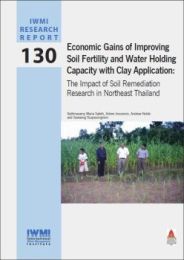Economic Gains of Improving Soil Fertility and Water Holding Capacity with Clay Application: The Impact of Soil Remediation Research in Northeast Thailand.
Citation:
Saleth, Rathinasamy Maria; Inocencio, Arlene; Noble, Andrew, D.; Ruaysoongnern, S. 2009. Economic gains of improving soil fertility and water holding capacity with clay application: the impact of soil remediation research in northeast Thailand. Colombo, Sri Lanka: International Water Management Institute (IWMI) 30p. (IWMI Research Report 130) [doi: 10.3910/2009.130]
Abstract
Declining productivity of agricultural soils in Northeast Thailand is a challenge facing land managers and farmers. A program was initiated in 2002 to investigate the potential role of incorporating clay-based materials into degraded soils as a means of enhancing productivity. This research report attempts to provide an ex-post assessment of the field level impact and economic viability of this approach, using the empirically derived estimates of the average income impacts that the application of bentonite or clay technology has generated among farm communities in Northeast Thailand. From an exclusive IWMI perspective, the impact evaluation suggests that the program has a net present value (NPV) of US$0.41 million with a benefit-cost ratio (BCR) of 2.44 for the sample, and a NPV of US$21 million with a BCR of 75 for the region.
ISBN 978-92-9090-707-7
ISSN 1026-0862


